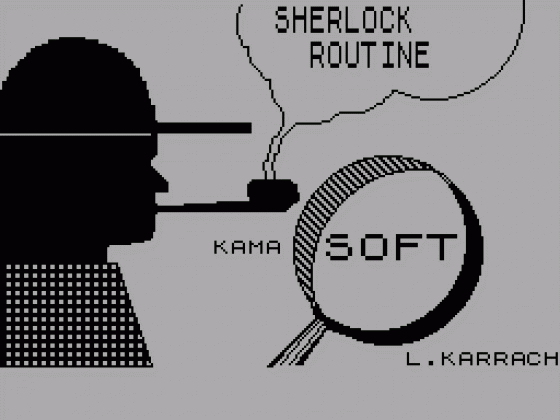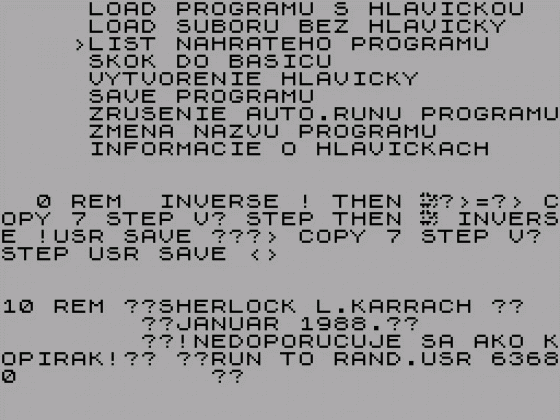
Personal Computer News
 27th October 1984
27th October 1984
Categories: Review: Software
Author: Bob Chappell
Publisher: Kamasoft
Machine: Spectrum 48K
Published in Personal Computer News #084
SHERLOCK
I was just smoking my Stradivarius and playing a snatch of Baker Street Blues on the old meerschaum when Melbourne House popped Sherlock, their latest adventure, through my letterbox.
It's been worth the wait. Sherlock has all the features of its illustrious predecessor, The Hobbit and then some. The graphics may be fewer and simpler but in every other respect I take my deerstalker off to it - a winner if ever there was.
You take on the role of Sir Arthur Conan Doyle's famous detective, Sherlock Holmes, out to solve some inexplicable murders. Faithful Dr. Watson, a dim old buffer as ever, is on hand and you also get the opportunity to meet another famous character from the Holmes canon - Inspector Lestrade of Scotland Yard.

Having a large brain obviously puts extra strain on the legs - you move between most locations by taking a hansom cab or train. You have to first hail and then direct the cabbie to the required destination or, if letting the train take the brain, go to the right station and platform. Being a world-famous sleuth doesn't entitle you to free travel either - try sneaking off the cab without paying and your ears will burn. En route, you can use the time for quiet reflection or engage a fellow passenger in conversation.
Yes, you can talk and give orders to other characters, just as you could in The Hobbit, but Sherlock is far more sophisticated.
First, you can make remarks to other characters for them to mull over or respond to in their own good time. In this way, you can discuss aspects of the case with another character. Heaven help you if you pick Watson. I confronted the saintly codger with YOU KILLED BROWN and was told "That is brilliant Holmes, I do not know how you do it!"
Was Watson doing his usual impersonation of two short planks or had he discovered a subtle method of blowing a raspberry at Holmes?
Second, you can interrogate characters, asking them to tell you about certain objects or other characters. As a hypothetical example, you might say to Lestrade TELL ME ABOUT THE GUN or TELL ME WHAT HAPPENED.
As you might deduce from the examples, input can be quite complex. Just like The Hobbit, Sherlock makes full use of 'Inglish', a set of about 800 words with which over 53 different actions can be performed.
You can use adjectives to distinguish similar objects from each other (EXAMINE THE PLAIN DOOR), adverbs to qualify a particular action (READ THE DAILY CHRONICLE CAREFULLY) and prepositions to make your commands more specific (PUT THE BAG IN THE CUPBOARD).
The adventure takes place in real time, so while you are sitting staring at the ceiling for inspiration, the other characters are getting on with their lives. You may elect to wait and can even do so until a specific time (WAIT UNTIL 9.30AM). Day eventually turns to night and there are some places even Holmes wouldn't go without a light. You can also take naps - if you need one, perhaps some of the others might.
Two scrolling windows are used in the screen layout. The top three-quarters provides the narrative window while the bottom quarter displays your commands. The two areas are separated by a thick band, decorated with pistols and displaying the day and time. Some locations are represented graphically, such pictures occupying one side of the top window. Judging by the few I have seen, they are fairly simple depictions.
If you've ever played Infocom's Deadline or Witness then you'll have a good idea of the basics of Sherlock for there are marked similarities. It doesn't quite manage to come up to the very high standard of those two adventures but to be fair, they are disk-based and so effectively have a lot more memory to play around with. Nevertheless, in terms of sophistication, Sherlock is a long way ahead of the rest of the competition.
Sherlock is tough, perhaps one of the hardest adventures currently available. If this program doesn't train you to acquire a Homesian genius for observation and deduction, nothing will. It took me a while just to get out of my lodgings in 22b Baker Street, and that's where the adventure begins. I wasted valuable time fiddling (Sorry, Holmes!) with windows, armchairs and pipe racks before stumbling on to what was after all a startlingly obvious solution.
It's a pity that if you stop the game, you have to reload it once more from the beginning. Given the complexity of the program, perhaps it was unavoidable but it's still a pain.
At times, you may find yourself wondering just who the heck you are. The program allows you to preface objects with 'your' or 'my' (but not 'Holmes' - it isn't recognised). Just a mite confusing, that. Watch out if you decide to don a disguise - for example, a china mans (sic); the program starts referring to a Chinaman (it's you). thus taking an inventory reveals: "The china man is carrying your money."
There's no doubt in my mind that Sherlock is a superb program and will provide many hours (Hours? Months more likely!) of stimulating entertainment. Elementary, my dear Watson? Well, Holmes never did utter those immortal words - and I doubt whether you will, either.












